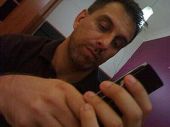I’m back, and I’ve been inspired to emerge from my (latest!) blogging hiatus by Personal Learning Environments, Networks, and Knowledge 2010 (#PLENK2010), a Massive Open Online Course (MOOC) facilitated by George Siemens, Stephen Downes, Dave Cormier & Rita Kopp.
Well, that’s a surprise!
I am surprised to find myself engaged in a course on Personal Learning Environments (PLEs) and Personal Learning Networks (PLNs). These were topics that were of a great interest to me back in the days when I was actively involved in the elearning, online learning and ed-tech sector, but I swore off this field in the mid 2008 (see Where in the World Wide Web is Sean?)
No more ed-tech for me, no siree!
I’d had enough. It wasn’t for me. I wasn’t making the impact I had hoped for. I seemed to be hitting my head against a brick wall all the time. (However, on reflection I’ve realised that the brick wall was internal, caused by my own fears, which led me to hold back from saying the things I wanted to say. No wonder I didn’t feel like I was getting anywhere, I didn’t feel heard and I end up feeling unsatisfied.)
Since then I’ve been off exploring (the not too inconsequential problems of) the state of the world, how we got to be in the situation we are in, and what we can do about it.
Finishing unfinished business
Now the emergence of the PLENK2010 MOOC has had me reviewing and thinking about that earlier period of my life and made me realise that there are many things I didn’t say back then – mainly because of a block I had about expressing opinions publicly – that I’d like to say now. I believe the MOOC will give me that opportunity.
New applications of old knowledge
I also feel that the principles underpinning PLEs, PLNs, MOOCs, and the pedagogical models and philosophies that accompany them – such as free and open learning, Networked Learning and Connectivism – offer great hope for creating the type of large-scale and rapid social transformations I believe are needed in this time of change, challenge and crisis.
I’d like to use this course to explore ideas about how we can use these tools, strategies and methodologies to create what one of my favourite thinkers, Charles Eisenstein, calls “the more beautiful world our hearts tell us is possible.”
Coming out of hibernation
So, after many years of self-imposed sequestration, I’ve decided to “go public” again, so to speak, and reconnect with the world.
The timing is a bit earlier than I had planned – I haven’t quite finished working through my ideas and gathering my resources for my new projects yet – but maybe waiting for things to be “perfect” rather than sharing my unfolding process has been part of my problem with expressing myself all along.
Although it feels weird and a bit scary, getting involved in the MOOC does feel like the right thing to do.
But how long will it last?
I’m not sure how involved I’ll be. And I might lose interest, especially if I’m not learning anything new, or if it gets too overwhelming (staying abreast of the things I’m interested in is hard enough without taking on a crazy, full-on MOOC about topics I thought I’d left behind!) We shall see.
Staying in this part of the blogosphere for now
I had intended to walk away from this blog and leave it behind when I left the ed-tech sector, but it seems like the logical place to continue to share my thoughts, ideas and explorations regarding the topics related to the PLENK2010 course.
So I’ve brushed the dust of this ol’ thang, picked a new blog template and revamped the design a little to reflect the it’s new purpose. All up I haven’t expended much energy on the changes, so if my interest does wane then nothing will be wasted.
I plan to publish my thoughts on other things I’ve been exploring elsewhere in due course.
For now, let the MOOCly adventure begin!








Pingback: Tweets that mention I’m baaaaack! And I’m reviving this blog for the PLENK2010 MOOC | Sean's Emerging… -- Topsy.com
Great to see you on PLENK, Sean, as we need people on the course who see technology not just as a technical tool, or as tools that can change learning, but as tools that impact on other aspects of our lives as well and have the potential to be transformative in the sense of getting people of their chair and actively engaged in the world in which they live.
Thanks Rita. Are you the official greeter/encourager? 🙂
It works. Nothing worse than writing a heart-felt blog and having no comments!
I was going to make this point later in the course, but I feel one of the advantages of the aggregation and redistribution of participants blogs is that it’s nice to know someone will see your posts, and you don’t have to “blog into the void”. It’s a critical element of the MOOC, in my opinion.
Thanks for taking the time to read and respond.
And lets see how MOOCs can change the world! 🙂
Hi Sean
i think it is important at the start of a course like this that people realise that their posts are being read. Stephen’s aggregation makes the job of finding all of the posts a lot easier. I respond to posts that touch me somehow and yours did. My background is in community education and in using technology to get people back into learning and using technology in an active way to better their lives: by being involved in politics or direct action in their neighbourhoods.
Ah… so you’ve had experience with community-building.
A MOOC is much more of a community than a traditional course, and as such it needs to be approached by the facilitators differently than a traditional course, with the need to actively nurture participant’s blogging (and other) efforts, which should be seen as a necessary part of running a successful MOOC.
I’m reminded of George’s facilitator-as-gardener metaphor. You are doing a good job of watering and fertilizing those fragile little seedlings!
If you’re interested in using technology for change then watch this space!
You mentioning community education reminds me of my interest in how this model of education is inclusive. More on that later.
Great to have you back blogging Sean. I love your passion to use the tools of connectivism for the BIG converstations… ” hope for creating the type of large-scale and rapid social transformations I believe are needed in this time of change, challenge and crisis”. The political and religious systems though containing some well intentioned individuals seem to be so cumbersome and slow to get traction. Clearly the leadership is going to have to come from the ground up- committed and passionate individuals- how do you see connected learning networks playing a part in the big conversations?
Hi Wendy,
That’s what I intend to explore during this course. Watch this space! 🙂
Pingback: Some thoughts on Dave Cormier’s Massive Open Online Courses for Network Creation | Sean's Emerging…